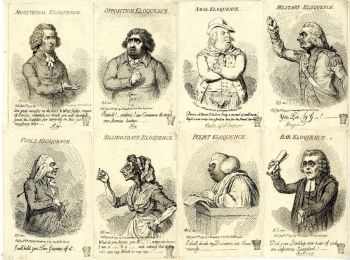Events
Forthcoming events:
Eloquent Voices: Orality in the Age of Print, 1750-1870
Tuesday 16 September 9:00 until 17:45
University of Sussex Campus : Arts A, Language Labs 3 and 4
Speaker: Keynote: Professor Mary Fairclough (University of York)
Part of the series: A one-day conference at the University of Sussex

James Gillray, Billingsgate Eloquence, 1795 © The Trustees of the British Museum. Shared under a Creative Commons Attribution-NonCommercial-ShareAlike 4.0 International (CC BY-NC-SA 4.0) licence
Orality, in various modes and practices, played an important part in the literary, philosophical and cultural outputs of this period, and complicates our understanding of eighteenth- and nineteenth-century print culture. Recent work has illuminated the richness of print’s relations with speech and voice, demonstrating how the very conceptualisation of orality was made possible through incipient awareness of emergent print culture, and showing that print objects were frequently consumed in oral modes, such as acts of communal performance or reading aloud.
This one-day conference gathers international scholars working on the intersections of print and orality in the period 1750-1870, to explore how print culture in Britain and beyond negotiated, harnessed, exploited, and regulated the powers of voice and their potentially wayward effects.
Contributions include papers and panels on:
- oral poetry and ballads;
- typographical representations of voice;
- muteness in fiction and print culture;
- rhetorical persuasion in the French Revolution
- American magazines in the early Republic;
- Working-class oracy and the struggle for the vote in Britain
The keynote address will be given by Professor Mary Fairclough (University of York) on 'Mary Wollstonecraft: Apostrophe, Prayer and Voice'.
Keynote Abstract:
Mary Wollstonecraft’s use of the rhetorical figure of apostrophe has attracted critical attention, in particular her deployment of apostrophe as part of the rhetorical armoury of A Vindication of the Rights of Men and A Vindication of the Rights of Woman. This paper takes a different approach to apostrophe in Wollstonecraft’s work, reading it as not just a persuasive tool, but rather as an indicator of Wollstonecraft’s sustained commitment to oral speech and its capacity to produce devotional feeling. I argue that moments of apostrophe in Wollstonecraft’s writings are often structured as prayerful direct addresses to God. I trace the connections between the prayers Wollstonecraft composed for her anthology for reading aloud The Female Reader (1789), and her later travel writing and fiction, making the case for the ongoing importance of vocal utterance and devotional appeal in Wollstonecraft’s works.
For further details of conference fees, and to register, go to the Sussex Online Shop (registration link coming soon).
Exact times TBC.
Posted on behalf of: Faculty of Media, Arts and Humanities
Last updated: Tuesday, 3 June 2025